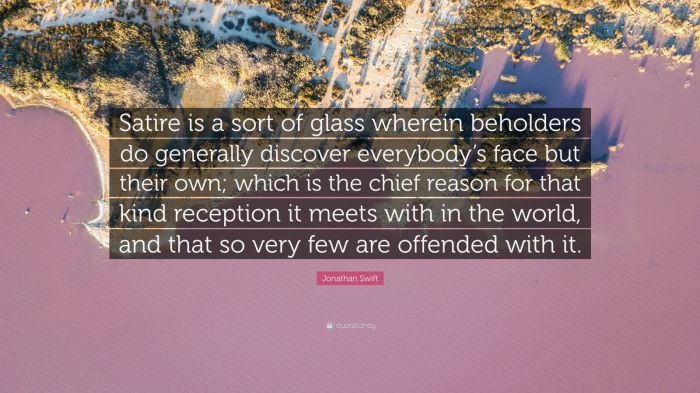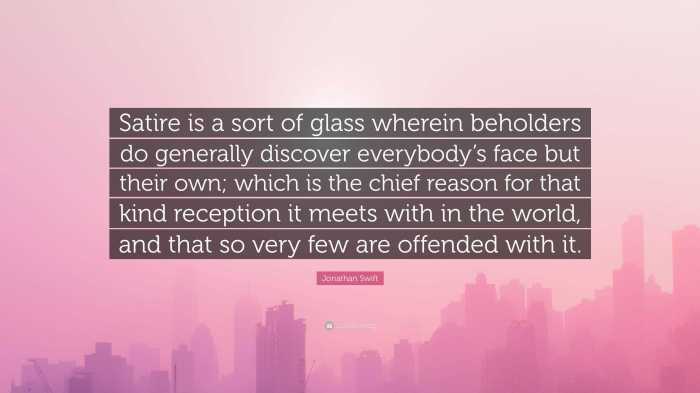Satire is a sort of glass, a transparent medium that reflects the flaws and follies of society. Through irony, exaggeration, and humor, satire holds a mirror to our world, exposing the absurdities and injustices that often go unnoticed.
This literary genre has a long and rich history, from the biting wit of Aristophanes to the sharp pen of Jonathan Swift. Satire has the power to provoke laughter, spark debate, and even inspire social change.
Definition and Nature of Satire

Satire is a literary genre that employs humor, irony, and exaggeration to criticize or ridicule individuals, institutions, or societal norms. It seeks to expose the shortcomings, follies, and vices of its targets through laughter and wit.Satire often uses literary devices such as irony, sarcasm, parody, and caricature to create a distorted or exaggerated representation of reality.
By doing so, it aims to highlight the absurdity or hypocrisy of its subject matter and provoke critical thinking in its audience.
Characteristics of Satire
Satire is characterized by several key features:
- Irony:The use of statements or situations that are the opposite of what is intended or expected, creating a sense of incongruity or absurdity.
- Exaggeration:The deliberate overstatement or amplification of certain aspects of reality to emphasize their ridiculousness or absurdity.
- Humor:The use of wit, humor, and laughter to make the criticism more palatable and engaging.
- Ridicule:The use of mockery, scorn, or contempt to expose the flaws or weaknesses of its targets.
Examples of Famous Satirical Works
Throughout history, satire has been used to critique a wide range of subjects, from politics and religion to social conventions and human nature. Some famous examples of satirical works include:
- The Canterbury Talesby Geoffrey Chaucer
- Don Quixoteby Miguel de Cervantes
- Gulliver’s Travelsby Jonathan Swift
- Animal Farmby George Orwell
- The Onion(a satirical news publication)
Satire as a “Glass”: Metaphorical Significance: Satire Is A Sort Of Glass

The metaphor of satire as a “glass” is apt because it captures the purpose and impact of this literary device. Like a glass, satire is transparent, revealing the flaws and absurdities of society.
Satire is a “glass” in the sense that it is a medium through which we can see the world as it truly is. It strips away the facade of respectability and exposes the underlying hypocrisy, greed, and folly that often go unnoticed.
Transparency of Satire
The transparency of satire allows us to see through the superficialities of society and recognize the underlying truths that are often hidden from view. Satire is a mirror that reflects the world back to us, showing us both our virtues and our vices.
Satire is like a glass, it can be transparent, showing the truth clearly, or it can be opaque, obscuring the message it tries to convey. The same can be said about pathway 1.0 chick fil a . It can be a straightforward path to understanding a complex issue, or it can be a winding road that leads to confusion.
The key is to be aware of the potential pitfalls and to use satire wisely.
Fragility of Satire
Satire is also a fragile “glass” that can be easily shattered by those who feel threatened by its power. Throughout history, satirists have been censored, imprisoned, and even killed for their work. This fragility reminds us of the importance of protecting freedom of expression and the right to criticize those in power.
Reflective Nature of Satire
Finally, satire is a “glass” in the sense that it reflects the values and beliefs of the society in which it is created. Satire is a product of its time and place, and it can tell us a great deal about the concerns and priorities of the people who produced it.
Social and Political Commentary in Satire

Satire plays a crucial role in exposing social and political flaws by highlighting inconsistencies, absurdities, and hypocrisies within society. It employs humor, irony, and exaggeration to criticize power structures, challenge societal norms, and provoke thought.
Throughout history, satire has been a powerful tool for social and political commentary. From the biting wit of Aristophanes in ancient Greece to the satirical cartoons of contemporary political commentators, satire has consistently served as a means to hold those in power accountable and to challenge prevailing ideologies.
Examples of Satire in Social and Political Commentary
- Political Cartoons:Political cartoons often use humor and visual imagery to critique current events, political figures, and societal issues. They provide a concise and impactful way to convey a satirical message.
- Satirical Novels:Novels like Gulliver’s Travelsby Jonathan Swift and Animal Farmby George Orwell use fictional worlds to satirize human nature, political systems, and social conventions.
- Stand-Up Comedy:Stand-up comedians frequently employ satire to poke fun at politicians, social norms, and everyday life. Their performances can be both entertaining and thought-provoking.
Impact of Satire on Public Discourse and Opinion Formation
Satire has a significant impact on public discourse and opinion formation by:
- Raising Awareness:Satire can draw attention to important issues and spark discussion by highlighting them in a humorous and accessible way.
- Challenging Perspectives:Satire can challenge prevailing views and encourage critical thinking by presenting alternative perspectives and questioning established norms.
- Influencing Opinions:While satire may not always directly change opinions, it can plant seeds of doubt and encourage people to reconsider their views.
Forms and Styles of Satire

Satire manifests in a myriad of forms, each employing distinct techniques and nuances to convey its critical messages. From the subtle wit of parody to the biting sarcasm of black comedy, satire adapts its form to amplify its impact.
Parody
Parody involves imitating or mimicking a specific work or style, often exaggerating its characteristics for humorous effect. It highlights the absurdity or flaws of the original by presenting a distorted or exaggerated version.
- Notable Parody:“The Adventures of Huckleberry Finn” by Mark Twain, a parody of sentimentalist novels.
Allegory
Allegory uses symbolic characters and events to convey a deeper meaning or moral lesson. It often employs personification, animal characters, or fantastical settings to explore complex social or political issues.
- Notable Allegory:“Animal Farm” by George Orwell, an allegory about the dangers of totalitarianism.
Black Comedy
Black comedy, also known as dark humor, uses humor to address serious or taboo subjects. It often explores the absurdity of life and human nature, often through morbid or macabre themes.
- Notable Black Comedy:“Dr. Strangelove or: How I Learned to Stop Worrying and Love the Bomb” by Stanley Kubrick, a satirical film about nuclear war.
Ethical Considerations in Satire

Satire, while often lauded for its comedic and critical prowess, must navigate ethical boundaries to avoid causing undue offense or harm. Understanding these boundaries and the potential consequences of satire is crucial for responsible and respectful expression.
Potential for Offense and Harm, Satire is a sort of glass
Satire’s inherent nature of ridicule and exaggeration can inadvertently cause offense or inflict emotional harm. The line between humor and insensitivity can be blurry, and satirists must be mindful of their targets and the potential impact of their words.
Responsibility and Respect
Satirists bear a responsibility to use their craft ethically. This includes respecting the dignity and rights of individuals, avoiding harmful stereotypes, and refraining from personal attacks that cross the line into defamation or harassment.
The Impact of Satire on Society

Satire is a powerful tool that can shape society in profound ways. Its impact can be both positive and negative, reflecting the complex nature of human communication and social dynamics.
- Promotes critical thinking:Satire encourages audiences to question assumptions, challenge conventional wisdom, and think independently.
- Enhances social awareness:By exposing societal flaws and injustices, satire raises awareness of important issues and fosters empathy.
- Facilitates political change:Satire can mobilize public opinion, hold leaders accountable, and drive social and political reforms.
Positive Effects of Satire
- Polarization:Satire can exacerbate existing social divisions by reinforcing stereotypes and caricatures.
- Erosion of trust:When satire becomes overly cynical or personal, it can undermine trust in institutions and public figures.
- Normalization of offensive language:Satire can blur the lines between acceptable and unacceptable speech, potentially leading to the normalization of harmful rhetoric.
Negative Effects of Satire
Satire is a double-edged sword, capable of both positive and negative effects. Its impact depends on factors such as the skill of the satirist, the context in which it is used, and the receptiveness of the audience.
Helpful Answers
What is the purpose of satire?
Satire aims to expose and criticize social, political, or human flaws through humor and irony.
Is satire always funny?
While humor is often a key element, satire can also be poignant, thought-provoking, or even愤怒.
Can satire be harmful?
Yes, satire has the potential to offend or cause harm if it is used irresponsibly or without regard for its impact on others.

